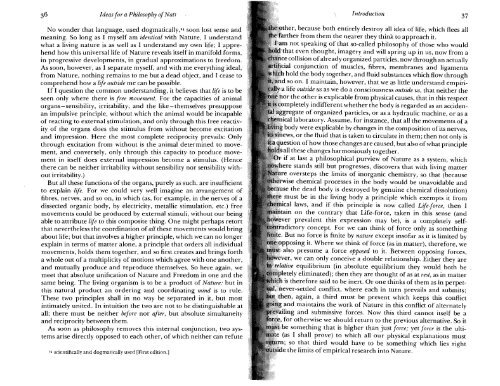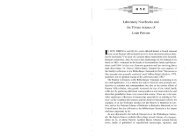Ideas for a Philosophy of Nature
Ideas for a Philosophy of Nature
Ideas for a Philosophy of Nature
Create successful ePaper yourself
Turn your PDF publications into a flip-book with our unique Google optimized e-Paper software.
36<strong>Ideas</strong> <strong>for</strong> a <strong>Philosophy</strong> <strong>of</strong>N aitIntroduction 37No wonder that language, used dogmatically," soon lost sense a-ndmeaning. So long as I myself am identical with <strong>Nature</strong>, I understandwhat a living nature is as well as I understand my own life; I apprehendhow this universal life <strong>of</strong> <strong>Nature</strong> reveals itself in manifold <strong>for</strong>ms,in progressive developments, in gradual approximations to freedom.As soon, however, as I separate myself, and with me everything ideal,from <strong>Nature</strong>, nothing remains to me but a dead object, and I cease tocomprehend how a life outside me can be possible.If I question the common understanding, it believes that life is to beseen only where there is free movement. For the capacities <strong>of</strong> animalorgans-sensibility, irritability, and the like - themselves presupposean impulsive principle, without which the animal would be incapable<strong>of</strong> reacting to external stimulation, and only through this free reactivity<strong>of</strong> the organs does the stimulus from without become excitationand impression. Here the most complete reciprocity prevails: Onlythrough excitation from without is the animal determined to movement,and conversely, only through this capacity to produce movementin itself does external impression become a stimulus. (Hencethere can be neither irritability without sensibility nor sensibility withoutirritability.)But all these functions <strong>of</strong> the organs, purely as such, are insufficientto explain life. For we could very well imagine an arrangement <strong>of</strong>fibres, nerves, and so on, in which (as, <strong>for</strong> example, in the nerves <strong>of</strong> adissected organic body, by electricity, metallic stimulation, etc.) freemovements could be produced by external stimuli, without our beingable to attribute life to this composite thing. One might perhaps retortthat nevertheless the coordination <strong>of</strong> all these movements would bringabout life; but that involves a higher principle, which we can no longerexplain in terms <strong>of</strong> matter alone, a principle that orders all individualmovements, holds them together, and so first creates and brings <strong>for</strong>tha whole out <strong>of</strong> a multiplicity <strong>of</strong> motions which agree with one another,and mutually produce and reproduce themselves. So here again, wemeet that absolute unification <strong>of</strong> <strong>Nature</strong> and Freedom in one and thesame being. The living organism is to be a product <strong>of</strong> <strong>Nature</strong>: but inthis natural product an ordering and coordinating mind is to rule.These two principles shall in no way be separated in it, but mostintimately united. In intuition the two are not to be distinguishable atall; there must be neither be<strong>for</strong>e nor after, but absolute simultaneityand reciprocity between them.As soon as philosophy removes this internal conjunction, two systemsarise directly opposed to each other, <strong>of</strong> which neither can refute'1 scientifically and dogmatically used [First cdition.]ther, because both entirely destroy all idea <strong>of</strong> life, which flees allrther from them the nearer they think to approach it.not speaking <strong>of</strong> that so-called philosophy <strong>of</strong> those who wouldhat even thought, imagery and will spring up in us, now from ae collision <strong>of</strong>already organized particles, now through an actuallyial conjunction <strong>of</strong> muscles, fibres, membranes and ligamentshold the body together, and fluid substances which flow throughso on. I maintain, however, that we as little understand empirilifeoutside us as we do a consciousness outside us, that neither ther the other is explicable from physical causes, that in this respectmpletely indifferent whether the body is regarded as an accidenregate<strong>of</strong> organized particles, or as a hydraulic machine, or as aical laboratorv, Assume, <strong>for</strong> instance, that all the movements <strong>of</strong> abody were explicable by changes in the composition <strong>of</strong> its nerves,ws, or the fluid that is taken to circulate in them; then not only isstion <strong>of</strong> how those changes are caused, but also <strong>of</strong>what principleall these changes harmoniously together.if at last a philosophical purview <strong>of</strong> <strong>Nature</strong> as a system, whichre stands still but progresses, discovers that with living mattere oversteps the limits <strong>of</strong> inorganic chemistry, so that (becauseise chemical processes in the body would be unavoidable andse the dead body is destroyed by genuine chemical dissolution)must be in the living body a principle which exempts it fromical laws, and if this principle is now called Life-<strong>for</strong>ce, then Iin on the contrary that Life-<strong>for</strong>ce, taken in this sense (ander prevalent this expression may be), is a completely selfdictoryconcept. For we can think <strong>of</strong> <strong>for</strong>ce only as something. But no <strong>for</strong>ce is finite by nature except ins<strong>of</strong>ar as it is limited bypposing it. Where we think <strong>of</strong> <strong>for</strong>ce (as in matter), there<strong>for</strong>e, wealso presume a <strong>for</strong>ce opposed to it. Between opposing <strong>for</strong>ces,er, we can only conceive a double relationship. Either they aretive equilibrium (in absolute equilibrium they would both beetely eliminated); then they are thought <strong>of</strong> as at rest, as in matteris there<strong>for</strong>e said to be inert. Or one thinks <strong>of</strong> them as in perpetever-settledconflict, where each in turn prevails and submits;en, again, a third must be present which keeps this conflictand maintains the work <strong>of</strong> <strong>Nature</strong> in this conflict <strong>of</strong> alternatelyiling and submissive <strong>for</strong>ces. Now this third cannot itself be a<strong>for</strong> otherwise we should return to the previous alternative. So itbe something that is higher than just <strong>for</strong>ce; yet <strong>for</strong>ce is the ulti(as I shall prove) to which all our physical explanations must; so that third would have to be something which lies righte the limits <strong>of</strong> empirical research into <strong>Nature</strong>.



